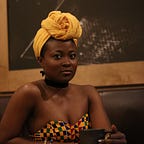An African’s Perspective on Anti-Black Racism in America
I am Black. This is a very obvious. I have never been misidentified as another race or perceived to be racially ambiguous. I’ve got that 4c hair, I’m dark all year round, and I operate on CPT (time is just a construct anyhoo). Being Black was something that I knew factually, but didn’t really pay much mind to. This changed when I moved to the U.S, a country that is so obsessed with race and racial identity. In Ghana, we focused on other identity markers such as tribal affiliation, religious identity, wealth status and educational background. So, it was quite shocking to me to suddenly have my race hyper-focused on, and to also have people make assumptions about me or my preferences, based on the color of my skin. Don’t get me wrong, racism is a global phenomenon and in my part of the world, it comes in the forms of colonialism and imperialism. Upon moving to the U.S, I learned very quickly that race wasn’t something of the past; it is a current and constant element that lurks behind every door, waiting to jump out and take over your entire experience.
Race is an identity marker that takes precedence in several aspects of American life. As an African who grew up in a predominantly Black country, it initially made no sense to me. Why do people have to check a list for which race they are? Why do others seem to get offended by the race someone else is? More importantly, why have systems been developed to structurally hold certain people back? As I’ve lived in this country longer and gotten a deeper understanding of things, I’ve had to pause and reflect on the system I was used to. In Ghana, people were discriminated against based on their tribal identity, but in the US, the determinant is one’s race; both systems essentially do the same thing. If I could understand that in Ghana, a person could be denied a job because their employer did not like members of their tribe, then surely, I should have understood that in the good ole’ U.S.of A, one can be denied a job because the employer does not like members of that person’s race. Here is the big issue though; in Ghana we rarely discussed ethnic/tribal inequities, so I could not easily draw parallels between the systems.
When I moved to the U.S, I was forced to confront the privilege I had taken for granted. Suddenly, I was not a member of the majority group. I was Black, and over here, Black is not a “good” thing. Black does not earn you good jobs; Black does not guarantee you an adequate educate; Black certainly does not guarantee you’ll survive police encounters. Sure, I was not raised in the U.S, but that certainly doesn’t matter to people who seem to believe that Black people do not belong in this country. No-one has ever stopped me to ask what type of Black person I am before they have said something racist or micro aggressive to me. Even when they detected the non-American accent on my English, they still went ahead and applied their racist stereotypes to me anyway! So in America, I have learned that it doesn’t really matter what type of Black you are, all Black is viewed as “bad” Black.
For some Africans, a strategy to cope with the change in identity is by separating from American-born Black people. So, an African who believes that they aren’t Black in the American sense of the word may try to distinguish from American Blacks by holding steadfast to their national or ethnic identity. For my fellow Africans, I have news for you. In America, we are all deemed Black. Your African-ness will not absorb all the punches that racist America will throw at you. If you open your eyes wide enough, you will see that the American dream did not include people like you, because for a very long time, the people who looked like you were considered property. It really hurts, when you realize the fall from grace. First, you’re ridiculed because of your nationality and accent, and then you’ll be doubted and discriminated against because of your melanin levels
I understand why some Africans may be reluctant to talk about race in America. Yes, our histories are different, but I question if they’re so different that we can’t relate? African Americans experienced slavery; we experienced colonialization (the jury is out on whether this ever really ended). African Americans were segregated and made to live in impoverished neighborhoods, and so were we. It’s okay to talk about the racism in this country, and admit that we also experience various levels (micro, mes, macro) of racism. It doesn’t make it our fault, and it certainly doesn’t diminish our Africanness. When Black Americans stand up to fight against police injustices, workplace discrimination, and other forms of systemic racism, we should join hands and fight with them. We are them and they are us! What they suffer, we suffer too! This country doesn’t care what type of Black we are, as long as we are Black, we suffer the same fate. So, why not join forces to fight for a better life and more equitable future for our skinfolk?
